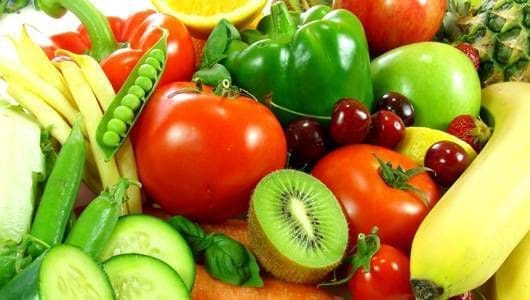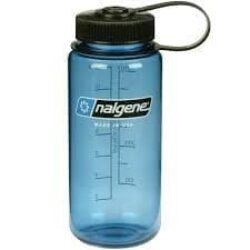Vitamins and minerals: Why, how much, and where to get them
Vitamins, Minerals, and Essential
March is National Nutrition month, so it seems fitting to talk about vitamins and minerals. We all know we need them, but where can we get them? How much do we need of each one? Why exactly do I need that vitamin? These are all valid questions that the following table should answer for you!

Vitamin A
What does it do?
-Promotes a healthy immune system
-Helps to remodel bone
-Regulates cell growth and division
-Helps keep skin healthy
-Helps prevent vision problems.
How much do I need per day?
Men: 900 mcgWomen: 700 mcg
Boys 9-13: 445 mcg
Boys 14-18: 630 mcg
Girls 9-13: 420 mcg
Girls 14-18: 485 mcg
Where can I find it? (based on 1 serving)
Baked Sweet Potato (1403 mcg), Boiled Spinach (573 mcg), Carrots (456 mcg), Cantaloupe (135 mcg), Red Peppers (117 mcg), Mangos (112 mcg), Skim Milk (149 mcg), and Fortified Cereals(130-150 mcg)
Vitamin C
What does it do?
-Helps to form collagen-Assists with protein metabolism
-Acts as an antioxidant
-Enhances immune function
-Helps in healing wounds
-Assists with brain function
– Helps the body to absorb iron.
How much do I need per day?
Men: 90 mgWomen: 75 mg
Boys 9-13: 39 mg
Boys 14-18: 63 mg
Girls 9-13: 39 mg
Girls 14-18: 56 mg
Where can I find it? (based on 1 serving)
Red peppers (95 mg), Grapefruit (78 mg), Oranges, (70 mg), Kiwi (64 mg), Green peppers (60 mg), Cooked Broccoli (51 mg), Strawberries (49 mg), Cooked Brussels Sprouts ( 48 mg), Raw Broccoli (39 mg), Cantaloupe (29 mg), Cooked Cabbage (28 mg), and Cauliflower (26 mg).
Vitamin D
What does it do?
-Promotes calcium absorption-Needed for bone growth and remodeling
-Helps with cell growth
-Helps with neuromuscular function
-Helps with immune function
-Helps reduce inflammation
How much do I need per day?
Men: 600 IUWomen: 600 IU
Boys 9-18: 600 IU
Girls 9-18: 600 IU
Where can I find it? (based on 1 serving)
Cooked Swordfish (566 IU), Cooked Salmon (447 IU), Canned Tuna (154 IU), Fortified Orange Juice (around 140), Fortified Skim Milk (115-124 IU), Fortified Yogurt (80 IU), Canned Sardines ((46 IU), and Eggs (41 IU).* Good supplement to take if you do not consume these foods often.
Vitamin E
What does it do?
–Acts as an antioxidant-Helps boost immune system
-Widens blood vessels
-Prevents blood clots
-Used by cells to help them interact with each other and carry out functions
How much do I need per day?
Men: 15 mgWomen: 15 mg
Boys 9-13: 9 mg
Boys 14-18: 12 mg
Girls 9-13: 9 mg
Girls 14-18: 12 mg
Where can I find it? (based on 1 serving)
Sunflower seeds (7.4mg), Almonds (6.8mg), Hazelnuts (4.3mg), Peanut Butter (2.9 mg), Peanuts (2.2 mg), Cooked Spinach (1.9 mg), Boiled Broccoli (1.2mg), Kiwi (1.1mg), Mango (.7 mg), Tomato (.7 mg), and Raw Spinach (.6 mg)
Vitamin B12
(This is only found in animal products, so if you choose to become a vegetarian or vegan, talk to your doctor about a supplement.)
What does it do?
-Helps keep nerve and blood cells healthy-Helps to make DNA
-Helps to prevent megaloblastic anemia
How much do I need per day?
Men: 2.4 mcgWomen: 2.4 mcg
Boys 9-13: 1.5 mcg
Boys 14-18: 2.0 mcg
Girls 9-13: 1.5 mcg
Girls 14-18: 2.0 mcg
Where can I find it? (based on 1 serving)
Cooked Clams (84.1 mcg), Fortified Cereals, Trout (5.4 mcg), Canned Tuna (2.5 mcg), Skim milk (1.2 mcg), and Low-fat yogurt (1.1 mcg)
Vitamin B6
What does it do?
-Needed for more than 100 enzyme reactions involving metabolism-Involved in brain development and immune function during pregnancy and infancy.
How much do I need per day?
Men: 1.3 mgWomen: 1.3 mg
Boys 9-13: 0.8 mg
Boys 14-18: 1.1 mg
Girl 9-13: 0.8 mg
Girl 14-18: 1.0 mg
Where can I find it? (based on 1 serving)
Chickpeas (1.1 mg), Fresh /Cooked Tuna (0.9 mg), Cooked Salmon (0.9 mg), Roasted Chicken Breast (0.5 mg), Boiled Potatoes (0.4 mg), and Bananas (0.4 mg)
Thiamin (B1)
What does it do?
-Helps with carbohydrate, protein, and fat metabolism-Needed for healthy skin, eyes, hair, and liver
-Helps with nervous system and Brain function
How much do I need per day?
Men: 1.2 mgWomen: 1.1 mg
Boys 9-13: 0.7 mg
Boys 14-18: 1.0 mg
Girls 9-13: 0.7 mg
Girls 14-18: 0.9 mg
Where can I find it? (based on 1 serving)
Wheat Germ Breakfast Cereal (4.47 mg), Fortified Cereals (.5-2 mg), White Rice (.26 mg), Cooked Peas (.21 mg), Brown Rice (.19 mg), and Pecans (.19 mg)
Niacin (B3)
What does it do?
-Helps with carbohydrate, protein, and fat metabolism-Needed for healthy skin, eyes, hair, and liver
-Helps with nervous system function
-Helps make various stress and sex related hormones
-Improve circulation
How much do I need per day?
Men: 16 mgWomen: 14 mg
Boys 9-13: 9 mg
Boys 14-18: 12 mg
Girl 9-13: 9 mg
Girl 14-18: 11 mg
Where can I find it? (based on 1 serving)
Canned Tuna (11.3 mg), Cooked Salmon (8.5 mg), Cooked Chicken (7.3 mg), Cooked Light Turkey (5.8 mg), Peanuts (3.8 mg), Enriched Pasta (2.3 mg), Cooked Lentils (2.1 mg), and Cooked Lima Beans (1.8 mg).
Riboflavin (B2)
What does it do?
-Helps with carbohydrate, protein, and fat metabolism-Needed for healthy skin, eyes, hair, and liver
-Helps with nervous system function
-Works as an anti-oxidant
– Helps body to use folate and B6
– Important for body growth and RBC production
How much do I need per day?
Men: 1.3 mgWomen: 1.1 mg
Boys 9-13: 0.8 mg
Boy 14-18: 1.1 mg
Girl 9-13: 0.8 mg
Girls 14-18: 0.9 mg
Where can I find it? (based on 1 serving)
Fortified Cereal (.59-2.27 mg), Skim Milk (.34 mg), Cooked Egg (.27 mg), Almonds (.23 mg), Boiled Spinach (.21 mg), Boiled Asparagus (.13 mg), Cooked Salmon (.12 mg), Cheddar Cheese (.11 mg), Boiled Broccoli (.10 mg), and Whole Wheat Bread (.06 mg)
Folate (B9)
What does it do?
-Assists in DNA synthesis-Helps metabolize amino acids
-Prevents neural tube defects in babies during pregnancy.
How much do I need per day?
Men: 400 mcgWomen: 400 mcg
Boys 9-13: 250 mcg
Boys 14-18: 330 mcg
Girls 9-13: 250 mcg
Girls: 14-18 330 mcg
Where can I find it? (based on 1 serving)
Boiled Spinach (131 mcg), Black-eyed peas (105 mcg), White Rice (90mcg), Boiled Asparagus (89 mcg), and Boiled Brussels Sprouts (78 mcg)
Calcium
What does it do?
-Helps to maintain strong bones-Helps muscle to move
-Helps nerves to carry messages throughout the body
-Helps vessels to move blood throughout the body.
How much do I need per day?
Men: 1000 mgWomen: 1000 mg
Boys 9-18: 1100 mg
Girls 9-18: 1100 mg
Where can I find it? (based on 1 serving)
Low Fat Plain Yogurt (415 mg), Fortified Soy Milk (368mg), Skim Milk (299mg), Fortified Orange Juice (261 mg), Tofu (253 mg),Cooked Collard Greens (178 mg), Cooked Spinach (146 mg), Cooked Soybeans (130 mg), and Boiled Turnip Greens (124 mg).
Iron (Heme and nonheme)
What does it do?
-Essential for oxygen transport and regulation of cell growth.-Heme iron is absorbed better into your body than non heme iron.
-Eating Vitamin C or meat protein with nonheme iron rich foods will help increase absorption.
How much do I need per day?
Men: 8 mgWomen: 18 mg
Boys 9-13: 5.9 mg
Boys 13-18: 7.7 mg
Girls 9-13: 5.7 mg
Girls 14-18: 7.9 mg
Where can I find it? (based on 1 serving)
Heme: Canned Oysters (5.7 mg), and Roasted Turkey (2.0 mg)Nonheme: Fortified Cereals (18 mg), Fortified Oatmeal (11 mg), Boiled Soybeans (8.8 mg), Lentils (6.6 mg), Kidney beans (5.2 mg), and Lima beans (4.5 mg)
Magnesium
What does it do?
-Helps to maintain muscle and nerve function-Keeps heart rhythm steady
-Supports a healthy immune system
-Keeps bones strong
-Helps to regulate blood sugar levels
-Promotes normal blood pressure
-Helps in protein synthesis.
How much do I need per day?
Men: 420 mgWomen: 320 mg
Boys 9-13: 200 mg
Boys 14-18: 340 mg
Girls: 9-13: 200 mg
Girls 14-18: 300 mg
Where can I find it? (based on 1 serving)
Wheat Bran (89 mg), Almonds (80 mg), Cooked Spinach (78 mg), Cashews (74 mg), Cooked Soybeans (74 mg), Wheat Germ (69 mg), Bran Flakes (64 mg), Peanuts (50 mg), Peanut butter (49 mg), Baked Potato (48 mg), and Black Eyed Peas (46mg)
Phosphorus
What does it do?
-Helps to build strong bones and teeth-Filters out waste in the kidney
-Reduces muscle pain post workout
-Balances use of other vitamins
-Needed for growth and repair of tissues and cells
-Helps produce DNA
How much do I need per day?
Men: 700 mgWomen: 700 mg
Boys 9-18: 1055 mg
Girls 9-18: 1055 mg
Where can I find it? (based on 1 serving)
Plain nonfat Yogurt (385 mg), Cooked Salmon (252 mg), Skim Milk (247 mg), Cooked Halibut (242 mg), *Cooked Lentils (178 mg), and Cooked Turkey (173 mg).* nuts, seeds, and grains are 50% less bioavailable
Potassium
What does it do?
-Important for the function of cells, tissues, and organs-Needed for proper heart function and muscle contraction
-Is an electrolyte.
How much do I need per day?
Men: 4700 mgWomen: 4700 mg
Boys 9-18: 3000-4000 mg
Girls 9-18: 3000-4000 mg
Where can I find it? (based on 1 serving)
Baked Potato (926 mg), Prunes (637 mg), Raisins (598 mg), Cooked Lima Beans (485 mg), Acorn Squash (448 mg), and Bananas (422 mg)
Zinc
-Helps the immune system fight off bacteria and viruses-Helps make proteins and DNA
-Helps wounds heal
-Important for taste and smell
How much do I need per day?
Men: 11 mgWomen: 8 mg
Boys 9-13: 7.0 mg
Boys 14-18: 8.5 mg
Girls 9-13: 7.0 mg
Girls 14-18: 7.3 mg
Where can I find it? (based on 1 serving)
Cooked Oysters (74 mg), Cooked Crab (6.5), Fortified Breakfast Cereal (3.8 mg), Cooked Lobster(3.4mg), Low Fat Yogurt (1.7 mg), and Cashews (1.6 mg)
Fiber
What does it do?
-Helps to prevent hunger in between meals-Reduces risk of diabetes, heart disease, diverticulitis, and constipation.
How much do I need per day?
Men: 25-38 gWomen: 25-30 g
Boys 9-18: 31-38 g
Girls 9-18: 26 g
Where can I find it? (based on 1 serving)
100% Bran Cereal (12.5 g), Cooked Navy Beans (9.6 g), Oats (8.3 g), Cooked Split peas (8.1 g), Cooked Lentils (7.8 g), Artichoke hearts (7.2 g), Canned Kidney Beans (6.8 g), and Prunes (6.2 g)
Side notes
- These daily recommendations are given in the values that they are typically measured by on food labels. To give you an idea of how they all compare here are conversions:
- 1 gram (g) = 1000 milligrams (mg)
- 1 milligram (mg) = 1000 micrograms (mcg)
- International Units change per substance.
- Vit D: 1 IU= 40 mcg
To see a more complete list of food option and sources visit:
- http://ods.od.nih.gov/
- www.unh.edu/dining/nutrition – calcium info
- http://lpi.oregonstate.edu/infocenter/vitamins/thiamin/ – thiamine, niacin, phosphorus, riboflavin, and fiber info


